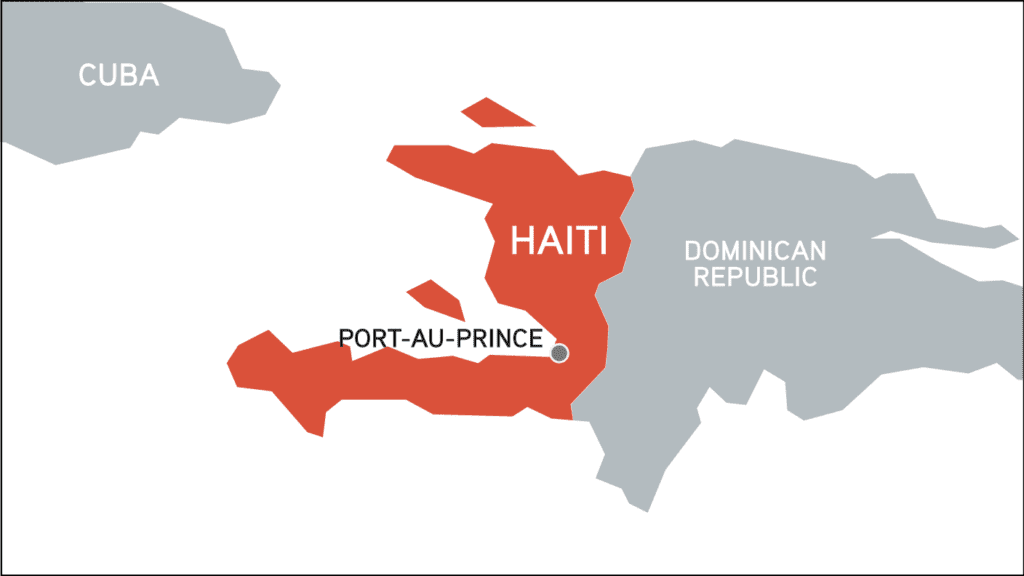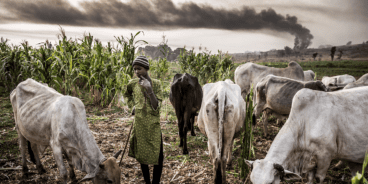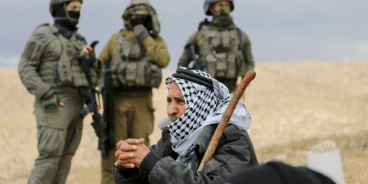Haiti

Populations in Port-au-Prince and Artibonite, Haiti, are facing possible atrocity crimes due to widespread violence and abuses by armed gangs.
BACKGROUND:
Since the assassination of then-President Jovenel Moïse in July 2021, violence has intensified in Haiti, particularly in Port-au-Prince, where armed gangs rapidly proliferated and have been perpetrating widespread abuses in a climate of total impunity. Approximately 300 criminal groups are active, and the UN estimates that 2.7 million Haitians, including 1.6 million women and children, live in areas under gang control. Several UN officials have warned that insecurity in the Port-au-Prince metropolitan area has reached levels comparable to countries in armed conflict and the UN Secretary-General has warned that gangs could overrun the capital. There has also been a significant rise in gang violence in Artibonite, a department in central Haiti, where populations face near-daily attacks and abuses.
Violence intensified throughout 2024, particularly in late February when two of the largest gang coalitions, G9 and Gpèp, formed an alliance known as Viv Ansanm and launched a coordinated offensive targeting critical civilian infrastructure across Port-au-Prince. As clashes between rival groups have decreased, gangs are increasingly targeting civilians and civilian infrastructure, including schools, medical facilities and humanitarian organizations. Populations are often confined to their neighborhood and face indiscriminate violence, rape, torture, kidnappings and forced recruitment, exploitation and trafficking of children. In 2024 gang violence resulted in at least 5,600 people killed – approximately 1,000 more than in 2023 – according to the UN. In response to escalating violence and the inability of the Haitian National Police (HNP) to protect communities, a civilian self-defense movement – known as “Bwa Kale” – emerged in April 2023. Members of Bwa Kale systematically kill and burn suspected gang members. In 2024 the Human Right Service of the UN Integrated Office in Haiti (BINUH) documented more than 596 people lynched or executed.
The ongoing crisis has had a devastating impact on women and children. Several top UN officials and experts have reported that gangs are increasingly using systematic sexual violence, including collective rape and mutilation, as a means of exerting territorial control and to terrorize and inflict pain on communities. The UN Security Council (UNSC)-mandated Panel of Experts observed that the use of sexual violence is a systematic and pervasive tactic. Grave violations against children rose twelvefold in 2024 compared to 2023. According to the UN Children’s Fund, forced recruitment of children rose by 70 percent between mid-2023 and mid-2024, with children now comprising up to 50 percent of armed group members, including some as young as eight years old.
Insecurity has compounded an existing humanitarian crisis, with 5.4 million Haitians facing acute food insecurity. The number of internally displaced people has surpassed 1 million, marking a threefold increase in one year. Despite life-threatening risks, more than 200,000 Haitians were forcibly repatriated in 2024. A UN Women Rapid Gender Assessment found that aggression against women and girls, particularly rape, is being used in most makeshift camps as a deliberate tactic to control access to scarce humanitarian assistance.
The grave security situation has been exacerbated by protracted political deadlock, as well as a dysfunctional judiciary and the lack of legitimate executive or legislative bodies, in the last several years. In April 2024 a Transitional Presidential Council (TPC) was installed and made responsible for preparing a roadmap toward elections – the first elections since 2016 – among other tasks. The TPC has been embroiled in a corruption scandal and political infighting, further eroding public trust in the government.
In response to the multidimensional crisis, in October 2022 the UNSC established a sanctions regime and arms embargo. In September 2024 the UNSC sanctioned a leader of the Gran Grif gang – one of the largest and most powerful gangs in Artibonite – as well as a former parliamentarian, the first member of the Haitian elite to be sanctioned by the UN for allegedly forming, supporting and arming the group. Meanwhile, in June 2024 the UNSC-authorized Multinational Security Support Mission (MSS), led by Kenya, began joint operations alongside the HNP to combat gangs and restore security under strict adherence to international law, including respect for human rights and the use of force protocols.
RECENT DEVELOPMENTS:
In recent months, gangs have launched several coordinated deadly assaults across Port-au-Prince and Artibonite – as well as in the southern part of the West Department, which had previously been unaffected by violence. In late 2024 massacres resulted in over 300 deaths, including in Wharf Jérémie, Pont Sondé and Petite Rivière. During December gangs increasingly targeted healthcare in Port-au-Prince, further crippling a system already on the brink of collapse.
Since late January an assault in the strategic commune of Kenscoff by Viv Ansanm has resulted in the killing of dozens of civilians, forcible displacement and destruction to civilian property. In late February Haitian authorities issued a dozen arrest warrants against suspects accused of backing gangs in Kenscoff.
Escalating waves of violence have prompted calls for a robust UN peacekeeping operation. In February the UN Secretary-General proposed the creation of a UN office to provide logistics and operational support to the mission. Although the MSS has recently expanded to 1,000 officers, it still accounts for only 40 percent of the planned 2,500 personnel.
ANALYSIS:
Populations living in gang-controlled territory are at heightened risk of grave and widespread human rights abuses, including killings, kidnappings and sexual violence, which may amount to crimes against humanity. As clashes between rival groups have decreased, systematic violence against civilians and civilian infrastructure has escalated.
Although the MSS have developed crucial human rights safeguards and mechanisms, the mission continues to face financial and capacity challenges, while the lack of public disclosure regarding the rules of engagement raises concerns about transparency and accountability.
Insecurity leaves many without access to any public services, exacerbating existing inequalities which fuel patterns of exclusion – a driver of violence and recruitment. As gangs expand their control over strategic resources and key transport routes, they not only hinder freedom of movement but have also become more economically autonomous and powerful. Increased pressure on land and extortion by gangs on farmers and traders leave them vulnerable and endanger people’s livelihoods.
The prevalence and spread of gang violence is also fueled by long-standing close ties between gangs and elites, as well as the power vacuum created since the assassination of former President Moïse. For decades, police, politicians and other elites utilized gangs to enforce their authority and provided them with funds, weapons and impunity for abuses.
RISK ASSESSMENT:
-
- Proliferation and flow of illicit arms and ammunition, fueling violence and providing the means for perpetrating abuses.
- Grave acts of violence, including forcible recruitment of children, as well as systematic sexual violence, particularly against women and girls.
- Political instability, weak state institutions and under resourced and outnumbered police force.
- Near-complete impunity for violence against civilians, emboldening gang members to perpetrate further abuses.
- Lack of attention and security presence in Artibonite, allowing gangs to strengthen outside of the capital and leaving communities vulnerable to extortion, kidnapping and attacks.
NECESSARY ACTION:
The international community, particularly the United States, must impose stricter measures to prevent the illicit supply, sale, diversion or transfer of small arms, light weapons and ammunitions into Haiti. Those responsible for serious abuses, as well as those providing support to and financing gangs, should be investigated and prosecuted in line with international human rights standards. The UNSC should update the list of individuals and entities subject to sanctions for supporting, preparing, ordering or committing violations or abuses of International Human Rights Law (IHRL). The HNP must vet all its members and remove any officers who have colluded with gangs or the Bwa Kale movement.
In cooperation with BINUH, OHCHR and Haitian civil society, the MSS must effectively implement and comply with its human rights safeguards, monitoring mechanisms and accountability measures. The international community should ensure that the transitional government and the MSS have sufficient resources to restore the rule of law and provide basic security.
States in the region must end the collective expulsions and forced returns of Haitians and uphold their obligations under IHRL and international refugee law.
Atrocity Alert No. 439: Haiti, Central African Republic and Israel and the Occupied Palestinian Territory
Related Content

Atrocity Alert No. 444: Nigeria, Haiti and South Sudan

